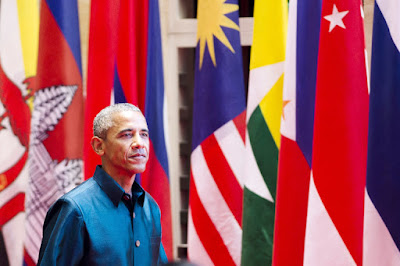
ชี้โอบามาสร้างผลงานแจ่มในอาเซียน ยกเว้นกับ "ไทย" คือจุดบอด
ที่มา ข่าวสดออนไลน์
07 กันยายน พ.ศ. 2559
เมื่อวันที่ 7 ก.ย. เอเอฟพีรายงานวิเคราะห์บทบาทและผลงานของประธานาธิบดีบารัก โอบามา ผู้นำสหรัฐอเมริกา ในภูมิภาคเอเชียตะวันออกเฉียงใต้ ขณะเดินทางมาเยือนสปป.ลาว เพื่อร่วมประชุมสุดยอดผู้นำอาเซียน และการประชุมที่เกี่ยวข้อง ว่านายโอบามาประสบความสำเร็จดีในการสร้างมิตรใหม่ๆ ในอาเซียน และใส่ใจกว่าในยุคจอร์จ ดับเบิลยู. บุช แต่ความล้มเหลวที่สุดกลับเป็นกรณีของไทย มหามิตรเก่าแก่ที่สุดในภูมิภาค
ในการมาเยือนสปป.ลาว ซึ่งเป็นการทิ้งทวนก่อนหมดวาระ นายโอบามาแสดงให้เห็นถึงผลงานที่ดำรงตำแหน่งมา 8 ปี ผลักดันยุทธศาสตร์ให้สหรัฐหวนกลับมาใกล้ชิดกับภูมิภาคเอเชีย ผู้นำสหรัฐผูกมิตรกับลาวด้วยท่าทีจริงใจ รวมถึงสนับสนุนงบประมาณต่อเนื่อง 3 ปี มูลค่า 90 ล้านดอลลาร์ หรือราว 3,150 ล้านบาทสำหรับโครงการเยียวยาผลกระทบจากกับระเบิดที่สหรัฐเคยทิ้งไว้ในยุคสงครามเวียดนาม

นอกจากนี้นายโอบามายังกระชับสัมพันธ์แนบแน่นกับเวียดนาม รวมถึงพม่าที่เดินทางมาเยือนถึง 2 ครั้ง ช่วยสร้างความมั่นใจให้เหล่าผู้นำทหารเดินหน้าสู่การเลือกตั้งที่มีรัฐบาลพลเรือนนำโดยนางออง ซาน ซู จี ได้ในที่สุด

อย่างไรก็ตาม ในส่วนของไทยที่เกิดรัฐประหารปี 2557 การทูตของสหรัฐกลับแข็งทื่อ สหรัฐไม่อาจทำให้เหล่าผู้นำกองทัพฟื้นฟูการเลือกตั้งได้อย่างรวดเร็ว หรือผ่อนปรนการควบคุมผู้แสดงความคิดเห็นที่แตกต่างจากรัฐบาล เมื่อสหรัฐออกโรงเตือนเรื่องสิทธิมนุษยชนที่ย่ำแย่ลง กลับไม่ได้รับการตอบสนอง มีแต่การแสดงอารมณ์หงุดหงิดรำคาญใจจากไทย
มาตรการที่สหรัฐใช้มีเพียงการระงับงบประมาณทางทหารเกือบ 5 ล้านดอลลาร์ หรือราว 175 ล้านบาท แต่ไม่ได้ระงับความร่วมมือทางกองทัพ ยังคงมีการฝึกทหารร่วมประจำปีเช่นเดิม ในขณะที่เจ้าหน้าที่สหรัฐต่างเกรงว่าไทยจะตีตัวออกห่างสหรัฐไปหาจีนมากขึ้นทุกที และอาจสายไปแล้วสำหรับรัฐบาลยุคโอบามาที่จะแก้ไขอะไรในขณะนี้

เออร์เนสต์ บาวเวอร์ จากศูนย์ยุทธศาสตร์และการศึกษาระหว่างประเทศ สหรัฐอเมริกา กล่าวว่า ในขณะที่ร่างรัฐธรรมนูญฉบับใหม่ปกป้องอำนาจกองทัพ ทหารก็จะครองบทบาทหลักในการจัดรูปแบบการเมืองใหม่
เดส วอลตัน อดีตเจ้าหน้าที่ทูตทหารในกรุงเทพฯ กล่าวว่า ผู้มีอำนาจขยายความสัมพันธ์กับจีนและรัสเซีย จนมองไม่เห็นว่า จะสอดคล้องกับผลประโยชน์ของสหรัฐอย่างไร
"ถ้าคุณมาจากเกาหลี ทุกทางที่ลงไปยังประเทศไทย คุณจะเจอแต่แนวที่เป็นจีนทั้งหมด ไม่มีจุดไหนเลยที่จะให้สหรัฐเข้าไปถึงใจกลางเอเชียได้ มีแต่ประเทศไทย" นายวอลตันกล่าว
สำหรับความหวาดกลัวว่าคนในสังคมไทยจะย้ายข้างมาต่อต้านสหรัฐนั้น อาจเร็วเกินไปที่จะสรุปเช่นนั้น เพราะแม้กลุ่มอนุรักษนิยมมักฮึดฮัดกับคำตำหนิของรัฐบาลสหรัฐต่อรัฐบาลทหาร แต่ในเรื่องขยายการค้า การศึกษา และความเชื่อมโยงทางการทูตก็ยังดีอยู่
ขณะเดียวกัน แม้ว่ารัฐบาลจีนจะไม่เคยวิพากษ์วิจารณ์ไทย แต่ถึงขณะนี้ก็ยังไม่ได้สนับสนุนอะไรเต็มที่ ดูได้จากโครงการพัฒนาโครงสร้างพื้นฐานต่างๆ ยังไม่ไปถึงไหน สหรัฐเองจึงยังมีโอกาสอยู่ เพียงแต่คงไม่ทันแล้วในยุครัฐบาลโอบามา

"ผมคิดว่าการแทรกแซงระดับประธานาธิบดีจะทำให้เกิดการเปลี่ยนแปลงได้ แต่คงไม่เกิดในรัฐบาลโอบามาแล้ว" นายบาวเวอร์กล่าว หลังจากไม่มีการพบปะระดับทวิภาคีระหว่างโอบามากับผู้นำไทยบนเวทีการประชุมที่ลาว แม้จะมีการร่วมโต๊ะอาหารค่ำเดียวกันในงานเลี้ยงของอาเซียน
ooo
As Obama caps Asia pivot, Thailand seen as missing piece
President Barack Obama attends a farewell dinner with Southeast Asian leaders Wednesday, capping eight years of careful courtship that has created new friends, but left links frayed with America's oldest regional ally -- Thailand.
When Obama looks around the gala dinner table in Vientiane, he will find a bevy of new partners.
His engagement with former Communist foes in Vietnam and now Laos is slowly easing the bloody burden of history, in much the same way as his opening to Cuba.

US President Barack Obama (L) and South Korean President Park Geun-hye (R) hold a meeting in Vientiane, Laos, on September 6, 2016 ©Saul Loeb (AFP)
Source: AFP
7 September 2016
More striking still will be the presence of Myanmar's de facto leader Aung San Suu Kyi, who spent much of the last three decades held prisoner by a brutal military junta.
Obama's engagement with Myanmar -- a country he has twice visited -- has butressed a political transformation, helping convince the generals to share power with Suu Kyi's democratically elected government.
"Just sitting back and criticizing countries has a limit in terms of what it can achieve," said Ben Rhodes, an Obama aide who has worked closely on the US' policy to Myanmar.
Where George W. Bush routinely skipped meetings with Southeast Asian heads of state, Obama -- perhaps unsurprisingly for someone who spent a chunk of his childhood in Indonesia -- has been a regular visitor.
- Bouquets and brickbats -
But the trips have not all been plain sailing, as Obama was reminded this week when he was labelled a "son of a whore" by firebrand Philippine leader Rodrigo Duterte.
Yet experts say it is Thailand that represents the starkest failure to leverage US diplomatic power in the region.
Two military coups in quick succession have damaged relations with Bangkok, a treaty ally and regional powerhouse whose relations with Washington date back more than 180 years.
The US has not been able to prod the generals into restoring elections or easing controls on dissent.
Notoriously prickly junta leader, Prayut Chan-O-Cha, has also frequently bristled at US criticism of the darkening human rights environment in his country.
Even the smallest diplomatic slight, perceived or imagined, has the ability to sour relations further.
When Prime Minister Prayut talked to Obama on the margins of the US-ASEAN summit in Sunnylands, California, this year, US and Thai sources said the junta leader felt bridges were being rebuilt following the coup.
But on landing in Bangkok he was furious when told a mid-level State Department official had publicly berated his government's human rights record.
A Thai official told AFP that public opinion in his country could ultimately swing against the United States.
For their part, US officials point out that Thailand's latest coup left Washington with little room to manoeuvre.
"We did the bare minimum we had to do under the law," said one former Obama official, referencing a near $5 million cut in military aid immediately after the last coup in 2014.
But the US has not scrapped wider military co-operation, including annual war games held by the kingdom.
Still, some American officials worry that Thailand is being pushed too far towards its powerhouse neighbour China.
That could be particularly damaging given the context of a "once in a century reordering of political and economic power in Thailand," driven by a looming royal succession, according to Ernest Bower, a Southeast Asia expert at the Center for Strategic and International Studies.
With army power entrenched by a new constitution, the military are set to be a key player in the new political order.
The Thai military used to be "partnered almost exclusively with the United States and that is changing," said Des Walton, a former defense attache in Bangkok.
"They are expanding relations notably with China and Russia," he said. "At face value I don't see how that is consistent with US interests."
- Too late for Obama -
Thailand remains strategically pivotal to US regional interests.
"If you go from Korea all the way down to Thailand there is a huge swath which is basically all China, where the United States doesn't have access to mainland Asia. Thailand is it," he added.
But fears Thai public opinion could swing against the United States, may be premature.
While royalist conservatives hiss at any US condemnation of the junta, wider trade, education and diplomacy links remain strong.
Beijing does not criticise the junta, but it has so far failed to deliver on several gilded promises of support for major infrastructure projects.
Some in Washington believe that provides an opportunity for rapprochement.
But it may be too late for Obama.
"I think only presidential intervention would make a difference and that is not going to happen with the Obama administration," said Bower.
The White House says another pull-aside meeting with Prayut is unlikely to take place in Laos, even if they are in the same dining room together.

Factfile on the 10-member Association of Southeast Asian Nations ©Laurence CHU, Gal ROMA (AFP)

Thailand's Prime Minister Prayuth Chan-ocha (C) attends a welcome dinner at the ASEAN Summit in Vientiane on September 6, 2016 ©Ye Aung Thu (AFP)

.jpg)








